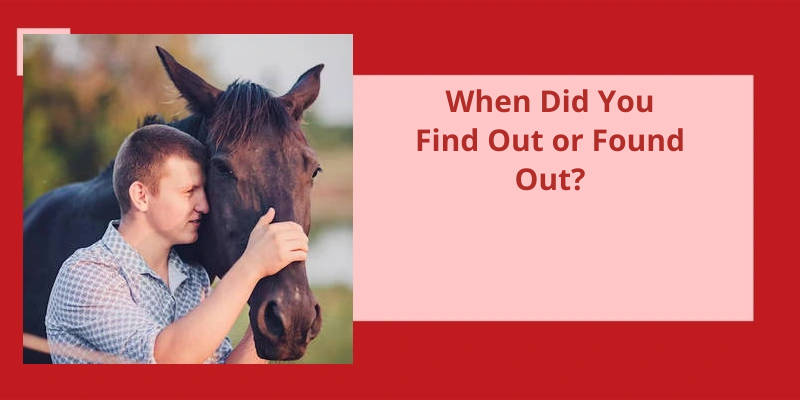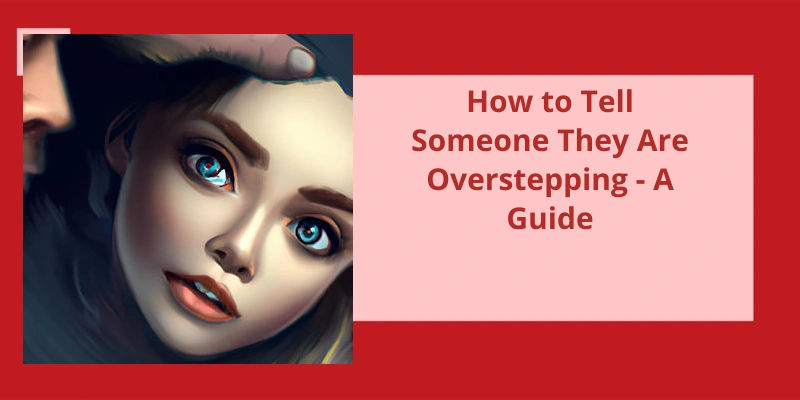This question revolves around the timing of gaining knowledge or discovering something, with both variations – "when you find out" and "when you found out" – being correct. "When you find out" pertains to a future event, implying the imminent revelation of information or understanding. Both variations highlight the significance of timing in the process of gaining awareness, whether it be an upcoming realization or a past revelation.
What Is the Difference Between Find and Found Out?
When did you find out or found out? This question often arises when trying to distinguish between the different meanings and implications of the words “find” and “found out”.
Consider this scenario: today, I found some money on the ground. This implies a simple act of discovering something that was either misplaced or lost by someone else. It suggests stumbling upon an object without any prior knowledge or suspicions. This kind of finding is often associated with luck or chance.
On the other hand, when I say that today, I found out that my friend had been lying to me for years, it implies that I’ve suddenly become aware of a hidden truth or deception. The phrase “found out” indicates the process of uncovering information that was deliberately concealed or unknown to me before. It suggests a discovery that may challenge or alter my perception of a person, situation, or event.
The former focuses on the act of finding itself, while the latter emphasizes the epiphany or realization that occurs when new information is revealed.
For instance, when you find a lost book in a library, it displays the act of finding something physically. However, when you find out that your partner has been cheating on you, it refers to the process of gaining knowledge about their infidelity, suggesting a deeper emotional impact.
Their uses vary depending on whether we’re talking about physical findings or uncovering hidden truths.
The Role of Intention or Effort in the Act of Finding Versus Finding Out.
- The impact of intention in the process of finding information
- The role of effort in search and retrieval of relevant data
- Different approaches to finding information and the importance of intention
- Examining the concept of finding out and it’s relationship to intention
- The benefits and drawbacks of deliberate searching versus accidental finding
- Exploring how intention influences the level of comprehension and understanding
- The significance of effort and intention in problem-solving and decision-making
- Identifying strategies to enhance intention and effort in the act of finding information
- Considering the psychological and cognitive factors involved in finding versus finding out
- Understanding the role of motivation in the process of finding and finding out
Discovering new information can be an enlightening experience. Whether acquired through thorough research or by learning from others, the phrase “found out” is commonly used to express this process of uncovering something of interest. It’s important to note that find out is a phrasal verb with a past tense form as found out.
Is It Correct to Say Found Out?
When did you discover or become aware of something? This is a common question asked to gauge someones knowledge or awareness of a particular event or information. However, is it correct to say “found out”? In most cases, we use “find out” to imply the process of obtaining information through research or learning from someone else. The usual grammar pattern includes “find out” followed by a noun phrase or a subject/verb combination. For example, you may say, “I found out the truth from my friend” or “We found out about the party through social media.”
Other Phrases or Expressions That Can Be Used Instead of “Found Out”
- Discovered
- Uncovered
- Realized
- Learned
- Acquired knowledge of
- Became aware of
- Got wind of
- Figured out
- Gathered information about
Found is a versatile word that can be used in different contexts. One common usage is to refer to the establishment or creation of an institution, company, or organization. When someone or a group of people found something, they initiate and set it in motion, typically by providing the required resources or funding. For example, I’ve been a member of the club since it’s founding.
When to Use Found?
When did you find out or found? This question pertains to the appropriate usage of the word “found.”. Firstly, it’s important to note that “found” is the past tense and past participle of the word “find.”. This means that when you’ve already discovered or located something in the past, you’d use the term “found.”. For example, if you found a lost item yesterday, you’d say, “I found it yesterday.”
However, the word “found” can also be used in the context of establishing or creating an institution, company, or organization. In this case, when someone or a group of individuals initiate the formation or initiation of such an entity, they’re said to have “founded” it. This often involves providing the necessary resources, such as funding or other forms of support, to begin the organization. For instance, John and his friends founded a new startup company last year.
Additionally, the term “founding” can also refer to the act of setting up or originating something. For instance, when discussing the history of a particular club or organization, you might refer to it’s “founding” to indicate the time when it was first established. For example, “I’ve been a member of the club since it’s founding” implies that you joined the club when it was initially created.
It’s essential to understand the context in which these terms are used to ensure accurate communication.
The Importance of Understanding Context in Using the Word “Found”
In English, the word “found” can have multiple meanings depending on the context in which it’s used. One common meaning is to discover or learn something for the first time. For example, if someone asks, “When did you find out or found out about the party?”, they’re asking when you first discovered or learned about the party.
However, “found” can also refer to the act of establishing or creating something. For instance, if someone says, “He founded a new company,” they’re referring to the action of starting or establishing a new business.
Understanding the context is crucial to accurately interpreting the meaning of the word “found” in a given sentence. The context provides the necessary information to determine whether “found” should be understood as discovering or creating something.
Source: Have they found or did they find?
The phrase “find out” carries a dual meaning that encompasses both the act of acquiring knowledge through various means like study or observation, as well as catching someone in the act of doing something wrong. It’s a versatile expression that can be used to describe the process of discovering information or exposing wrongdoing.
What Is the Meaning of the Phrase Find Out?
The phrase “find out” carries two primary meanings in the English language. First and foremost, it refers to the act of learning or discovering something through study, observation, or deliberate investigation. This implies a process of actively seeking or exploring for information in order to gain knowledge or understanding about a particular subject. For example, one might find out the answer to a question by conducting research or consulting reliable sources.
How to Effectively “Find Out” Information Through Research and Investigation
To effectively “find out” information through research and investigation, there are a few steps you can follow. Firstly, clearly define the topic or question you want to investigate. This will help you stay focused and avoid getting overwhelmed by unnecessary information.
Next, start by conducting a preliminary search using credible sources such as academic journals, books, and reputable websites. This can give you an overview of the subject and help you identify key terms and concepts.
Once you’ve a better understanding of the topic, you can dive deeper into your research. Look for more specific sources that provide in-depth information, such as scholarly articles or case studies. Consider both primary sources (firsthand accounts or original research) and secondary sources (interpretations or analyses of primary sources).
Be critical of the sources you find. Evaluate their credibility, authority, and accuracy. Check for biases or conflicts of interest that may influence the information presented. It’s also important to cross-reference information from multiple sources to ensure it’s reliability.
Compile all the relevant data and evidence you gather during your research. Take detailed notes and organize your findings in a logical manner. This will make it easier to analyze and synthesize the information later on.
Lastly, draw conclusions and formulate your own understanding based on the evidence you’ve collected. Summarize your findings and present them in a coherent manner, whether it’s in a report, presentation, or discussion.
By following these steps, you can effectively “find out” information through research and investigation, allowing you to make informed decisions and deepen your knowledge on a particular topic.
What Have You Find or Found?
When did you find out or found something? This question brings to mind various scenarios where discovering or uncovering something plays a significant role. Whether it be stumbling upon a hidden treasure, stumbling upon a new passion or talent, or stumbling upon a life-changing revelation, finding something can have a profound impact on ones life.
The concept of finding something isn’t limited to physical objects alone. It can encompass a wide range of experiences and emotions. For example, one might find solace in a beautiful piece of music or find strength in a new friendship. These intangible discoveries can be just as transformative as discovering a tangible object.
Finding out about something can also refer to gaining knowledge or information. It could be finding out about a long-lost family member or discovering a shocking truth about ones past. This type of finding out often involves a process of investigation, research, or conversations with others who hold the key to the information being sought.
The timing of these findings or discoveries is often a crucial factor. Sometimes the moment of finding out is unexpected and catches us off guard, while other times it’s a deliberate search or effort to unravel a mystery. Regardless of the circumstances, finding out or finding something can offer a sense of fulfillment, closure, or new beginnings.
The act of finding out or finding something spans beyond just physical objects. It can pertain to emotions, knowledge, or new experiences. The present perfect tense, “have found,” is often used to express these moments when there’s no specific end time boundary in mind related to the discovery. Whether it’s a small, everyday finding or a life-altering revelation, these moments shape our lives and contribute to our personal growth and understanding. So, when did you find out or found something that impacted your life?
Personal Anecdotes of Significant Findings or Discoveries.
Discovering something new can be an exciting and memorable experience. Personal anecdotes of significant findings or discoveries can range from uncovering a hidden talent or passion to stumbling upon a groundbreaking scientific discovery. The moment of realization or revelation can vary greatly, depending on the context and nature of the finding.
For some, the discovery may happen suddenly, like a lightbulb going off in their mind. It could be a eureka moment where a solution to a problem becomes clear or a long-sought answer is finally found. Other times, the realization may come gradually, through a series of observations, experiments, or experiences.
The timing of when someone finds out or discovers something can also differ. It may occur during childhood, when curiosity and exploration are at their peak, shaping one’s interests and future endeavors. Alternatively, moments of discovery can happen later in life, when a new perspective or opportunity presents itself.
Each personal story of finding out carries it’s own significance and impact. Whether it’s a small revelation that brings joy or a life-altering breakthrough that changes the course of one’s journey, these anecdotes remind us of the power of curiosity, exploration, and the thrill of uncovering something new.
Conclusion
Thus, understanding the nuanced difference between these two variations allows for precise communication and accurate expression of temporal context.






